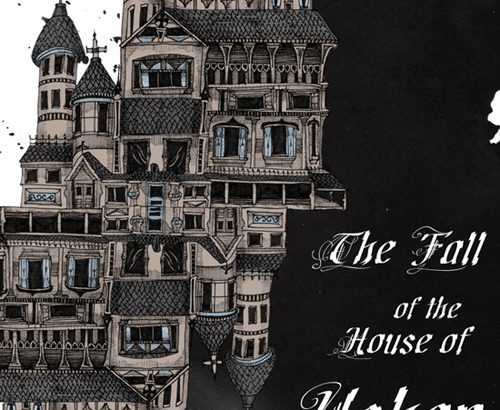
- Posted: September 20, 2016
- By: International Institute
- Comments: No comments
ENGLISH READING CIRCLE – SHORT STORY OF THE MONTH ANALYSIS: “THE FALL OF THE HOUSE OF USHER” BY EDGAR ALLEN POE
Hello and welcome to the 2016-2017 English Reading Circle! This year our theme is “American Masters,” and as a glance at our reading list will affirm, the writers we will work with all qualify to be referred to as such. This month's story, “The Fall of the House of Usher,” is a masterpiece of one of the unquestionable godfathers of American literature, Edgar Allen Poe. As a true American literary innovator, it seems only right that we should begin our cycle with him.
“The Fall of the House of Usher,” first published in 1839, stands as a landmark example of American Gothic writing, not only due to its style (dark, brooding, meticulous in its descriptions of the grotesque) or its themes (decay, collapse, the terrible sublime), but also in the way it marks itself as such, as Gothic, and directly confronts some of the key tenets of Romanticism, the Gothic's nobler, cheerier sibling. From the beginning of the story our unnamed narrator is conscious of the desperate desire within him to fashion via the power of imagination some poetic image out of the “desolate and terrible” scene of the house and the lands that surround it. But he cannot; there is only the fact of its decay, and the sense of its gathering doom. This story attempts to affix a limit to the romantic possibility of transcendence, and examine closely where and why these lofty intentions begin to break down.
Besides serving as an embodiment of Gothic consciousness, the story also represents an example of Poe's push for totality in narrative, wherein every element and detail is interconnected and relevant, and the story's principal forces are mirrored and collapsed into one another. This line of interpretation begins with the story's title: the “house” referred to is both the physical structure in which the action takes place, as well as the family itself, now reduced to Roderick and Madeline, the last of their line. Their “fall,” which is reflected at the story's conclusion by the literal collapse of their home, is the crux of the narrative, and worth parsing in detail. At first glance it's clear that Roderick, having his sister entombed alive, is being punished for that transgression. However, the corruption, perhaps, goes deeper. The question of incest has been raised by scholars for some time; whether or not the siblings are guilty of that most primordial perversion is, for the purposes of interpretation, somewhat besides the point. The fact is that the house of Usher and its inhabitants within have withdrawn from human society, and have isolated themselves, both as a sort of medical necessity (Roderick, a hypochondriac, suffers from hyperesthesia, while Madeline falls into deathlike trances) as well as an expression of preference. Roderick, in the company of his identical twin sister, is free to compose lyrical ballads that reflect his own story of him, and paint abstract pictures that only he can truly understand. But for what end? What is the role of art in his mind, and how has it been distorted, and turned into something terrible?
Obviously there is a great deal to unpack here, and I look forward to doing just that with you next week. Here's one last question to consider in preparation for our session: Why does Usher reach out to the narrator, and what function does the narrator serve in telling us the story? Perhaps Poe is presenting us with a potential remedy for the Gothic terror his perverted Romantic unwittingly unleashes: the transmission of the story itself, as something relatable, human, and wary of the allure of transcendence.
happy reading,
Andrew
(The English Reading Circle on Short Stories colloquium about this story will take place next week Tuesday September 27th at 14:30 p.m. You can sign up at www.iie.es/agenda)
Search
Categories
Recent news
-

Music from the Margins: Murder Ballads, Outlaws, and Jail Cell Lamentations – An Interview with David Burnett
18 April 2024 -

EDUCATORS AND FEMINISTS BETWEEN SPAIN AND AMERICA. NEW PEDAGOGICAL HORIZONS
October 11, 2023 -

Concerts at the International Institute – American Minimalism… and more!
September 12, 2023



